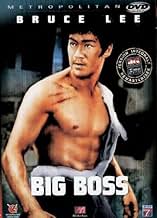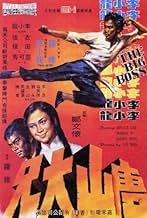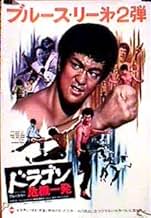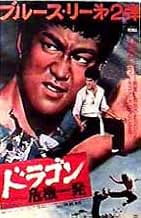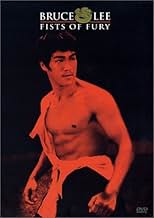VALUTAZIONE IMDb
6,9/10
31.053
LA TUA VALUTAZIONE
Un giovane che conduce una vita non violenta lavora con i suoi cugini in una fabbrica di ghiaccio dove misteriosamente iniziano a scomparire.Un giovane che conduce una vita non violenta lavora con i suoi cugini in una fabbrica di ghiaccio dove misteriosamente iniziano a scomparire.Un giovane che conduce una vita non violenta lavora con i suoi cugini in una fabbrica di ghiaccio dove misteriosamente iniziano a scomparire.
- Regia
- Sceneggiatura
- Star
James Tien
- Hsiu Chien
- (as Paul Tien)
Nora Miao
- Drinkstand owner
- (as Miao Ke Hsiu)
Ying-Chieh Han
- Hsiao Mi (Boss Mi)
- (as Han Ying Chieh)
Hua-Sze Li
- Ah Chai
- (as Li Hua Sze)
Marilyn Bautista
- Miss Wuman
- (as Malalene)
Billy Chan
- Ah Pei
- (as Hui-yi Chen)
Chia-Chen Tu
- Third Uncle
- (as Ka-ching To)
Recensioni in evidenza
After years of trying to get into Hollywood, Bruce Lee returned to Hong Kong and began his efforts with this low-budget martial-arts thriller. The result - an Asian box-office smash which made Lee an overnight sensation in the East. Whilst its not a great film or Lee's best work, it is an definite film classic that really opened the door for the martial-arts genre, as well as kicking off Lee's career. The story sees Lee coming to work in Banghok with his cousins in an ice factory, where he soon discovers sinister operations taking place under the thumb of the title villain. Like Lee's other films, the action builds up through the film to impressively staged fight scenes, all topped by a dramatic, all-out climatic bout between Lee and the Big Boss. Breakthrough stuff but the best (and the West) was yet to come.
Fists Of Fury was the second best of the Lee films. (Chinese Connection was tops). The speed, action and excitement in the film was unprecedented. The only thing that came close were the episodes of the Green Hornet and they were Lee also. He was the epitome of being physically fit and had screen presence like no action star before him. His fitness level and physical capabilities are qualities that some action stars have today, but at the time there was no one like him. Fists of Fury had a good story and the acting was good. In the last almost thirty years, you will be able to find films that are equivalent to the technical and production measures of this film, but none as good due to the fact that this was the first.
DHM
DHM
Cheng Chao-an (Bruce Lee) leaves his Chinese village to join relatives in Thailand. He is greeted by cousin Hsiu Chien who readily fights for others while Cheng promised his mother never to fight again. He joins his relatives at an ice factory owned by drug-lord big boss Hsiao Mi. When two of his cousins find drugs hidden in the ice, they are offered money but they politely refuse. They are killed and their bodies chopped up. Hsu Chien and Ah Pei go to ask questions but then they disappear. The men riot and Cheng is made foreman to appease them. Chiao Mei berates them for forgetting her brother. The boss throws him a party to get him drunk. Chiao Mei runs into him sneaking out of the brothel and the men are not happy that he forgot about Hsu Chien once again. Eventually, the hooker Sun reveals the truth and is killed. The boss's henchmen attack Chiao Mei and the family while Cheng is breaking into the factory. He finds drugs and the hidden bodies. He's confronted by the boss's son and numerous henchmen.
It's a functional kung fu story. The idea that he promised not to fight is great one. It allows him to be on another level when he actually does fight. It also allows him to be human. He gets tricked by the boss. He falls for a hooker. He's restrained by his promise. That makes the fights so much better. It's like he had saved all of his energy for his big fights. The movie is also more brutal and bloodier than I expected. The main thing is that this is a Bruce Lee movie and he shows that he's obviously a superstar. He's burning with charisma and it comes across on the screen.
It's a functional kung fu story. The idea that he promised not to fight is great one. It allows him to be on another level when he actually does fight. It also allows him to be human. He gets tricked by the boss. He falls for a hooker. He's restrained by his promise. That makes the fights so much better. It's like he had saved all of his energy for his big fights. The movie is also more brutal and bloodier than I expected. The main thing is that this is a Bruce Lee movie and he shows that he's obviously a superstar. He's burning with charisma and it comes across on the screen.
Tang Shan Da Xiong/The Big Boss(1971) is of all the Bruce Lee movies the most censored and cut because of some scenes of graphic violence. The violence in its uncut form seems to be on the level of the Street Fighter flicks with Sonny Cheiba. Bruce Lee doesn't show off his fighting skills until mid way through the film. What a great fighting performance Bruce Lee gives the viewer when he beats up the big boss's factory workers. Interestingly, the film has a couple of erotic scenes that are unusual for a Kung Fu movie. Both these scenes were either trimmed or cut from the picture. Bruce Lee's films would get less bloody by the time he did Enter the Dragon(1973). Mr. Vampire actor, Ching Ying Lam has a small part as the cousin of Cheng Chao An. Film that brought Bruce Lee international stardom even though the film was not very good. For a Kung Fu flick Bruce Lee is unable to show his full ability as a martial artist due to the filmmakers concern about his appearence in film. Bruce Lee would not fully utilized his excellent skills until the fight sequence at the Japanese martial arts school in Jing Wu Men(1972)/The Chinese Connection.
The Big Boss(1971) is noted for the infamous scene cut from the film of Bruce Lee spitting a man's head in half with a saw. A scene that has been lost scene since probably the film's debut in Hong Kong theatres. Just as infamous as the lost Pirhana scene of Cannibal Holocaust or the lost eye sucking scene from Full Contact. This sequence is definitely a scene that may have influenced similar sequences in The Streetfighter(1974). This one scene makes The Big Boss(1971) a must find in its fully uncut and uncensored form. Bruce Lee does well for what little material he had to work with. One gory sequence that was trimmed for the film's US release was the scene where Cheng sticks his fingers deep into the main villain's torso. It would be great if someone would find elements from The Big Boss(1971) in order to put together the longest print possible. The Hong Kong version is superior to the badly cut and badly dubbed American version. Its the version that I recommand the most for Bruce Lee admirers and fans.
The Big Boss(1971) is noted for the infamous scene cut from the film of Bruce Lee spitting a man's head in half with a saw. A scene that has been lost scene since probably the film's debut in Hong Kong theatres. Just as infamous as the lost Pirhana scene of Cannibal Holocaust or the lost eye sucking scene from Full Contact. This sequence is definitely a scene that may have influenced similar sequences in The Streetfighter(1974). This one scene makes The Big Boss(1971) a must find in its fully uncut and uncensored form. Bruce Lee does well for what little material he had to work with. One gory sequence that was trimmed for the film's US release was the scene where Cheng sticks his fingers deep into the main villain's torso. It would be great if someone would find elements from The Big Boss(1971) in order to put together the longest print possible. The Hong Kong version is superior to the badly cut and badly dubbed American version. Its the version that I recommand the most for Bruce Lee admirers and fans.
The first of the four Bruce Lee starring movies[ well, five, if you count Game Of Death]is technically the weakest. However, it's easy to see how it caused such a stir. Unlike most martial arts movies of the time, the film was set in the present day and attempted things like characterisation and even realism. These touches sometimes seem crude and even laughable now [for instance, check out the scene when the other workers of the factory are waiting for Lee to return, with it's exaggurated 'passing the time' actions]but when the film came out, it was a major step forward.
Even more daringly, the film has less fighting, with the fights being structured around the plot rather than the other way round, and bravest of all, the star of the film does not go into action into half way through. Instead, it cleverly builds suspense by having Lee as a guy who has sworn not to fight, and when he eventually cuts loose the result is exhilarating. However, it's obvious that none of Lee's opponents are a match for him and only the sequence when he battles a group of heavies in and around an ice factory really stands out. The clumsiness of much of the action [Lee was only allowed to choreograph the ice factory scene]is almost redeemed by the huge amount of gore and brutality.
Despite it's shoddy aspects, the film does have an odd power,especially towards the end. Lee's character is a very flawed hero who for a while badly strays from goodness and there is a sense that killing all the bad guys will not bring him redemption. In all three of Lee's Hong Kong films, violence never really solves things, it just makes things worse. Maybe that is why Lee's dated, sometimes awkward films are still watched again and again while many other films of the same time and genre have faded into obscurity. Well, that and Lee.
Even more daringly, the film has less fighting, with the fights being structured around the plot rather than the other way round, and bravest of all, the star of the film does not go into action into half way through. Instead, it cleverly builds suspense by having Lee as a guy who has sworn not to fight, and when he eventually cuts loose the result is exhilarating. However, it's obvious that none of Lee's opponents are a match for him and only the sequence when he battles a group of heavies in and around an ice factory really stands out. The clumsiness of much of the action [Lee was only allowed to choreograph the ice factory scene]is almost redeemed by the huge amount of gore and brutality.
Despite it's shoddy aspects, the film does have an odd power,especially towards the end. Lee's character is a very flawed hero who for a while badly strays from goodness and there is a sense that killing all the bad guys will not bring him redemption. In all three of Lee's Hong Kong films, violence never really solves things, it just makes things worse. Maybe that is why Lee's dated, sometimes awkward films are still watched again and again while many other films of the same time and genre have faded into obscurity. Well, that and Lee.
Lo sapevi?
- QuizBruce Lee endured "two days of hell" when he sprained his ankle badly while landing awkwardly from a jump from a high jump on a slipped mattress, and had to be driven to Bangkok to see a doctor, where he caught a virus in the hot and stuffy conditions. Close-ups were used to finish the fight, as Bruce struggled and had to drag his leg, which was covered up by, and contributed to, his character's worn out, exhausted appearance. He couldn't move properly and was also racked with aches and fever and was having difficulty keeping food down. Even so, filming continued. His twisted ankle meant that he had to drag his injured leg, so in several scenes he had to be filmed in closeup. He also broke a glass in his hand, resulting in a gash that required ten stitches. While at the hospital in Bangkok, he caught flu and rapidly lost ten pounds.
- BlooperWhen the guard dogs leap at Cheng, they are obviously thrown.
- Citazioni
Cheng Chao-an: Just keep away. Go on. It's not your fight.
- Versioni alternativeWhen the film was released in the United States, the death of Hsiao Mi, "The Boss", was cut down to him simply being stabbed in the chest with a knife in order to receive an "R" rating. The original version of his death, which not only shows an explicit close-up of the knife in his chest but Cheng Chao-an's fingers piercing his rib cage and blood flowing from under his shirt, would have given the film an "X" rating. This scene has since been restored for the Bruce Lee Ultimate Collection DVD released by Fox, and the Shout Factory DVD/Bluray releases.
- ConnessioniEdited into L'ultimo combattimento di Chen (1978)
I più visti
Accedi per valutare e creare un elenco di titoli salvati per ottenere consigli personalizzati
Dettagli
Botteghino
- Budget
- 100.000 USD (previsto)
Contribuisci a questa pagina
Suggerisci una modifica o aggiungi i contenuti mancanti



